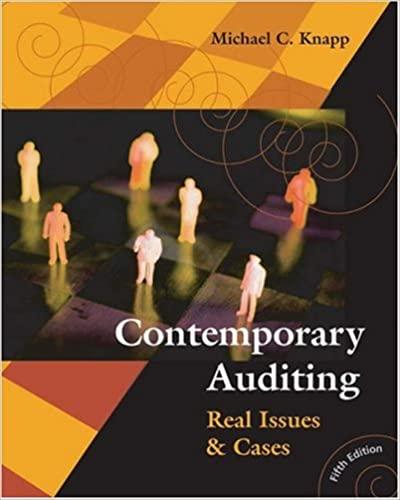In 1960, four partners founded Equity Funding Corporation of America, each assuming an equal ownership interest in
Question:
In 1960, four partners founded Equity Funding Corporation of America, each assuming an equal ownership interest in the firm. Two of the partners soon resigned, leaving the small company to Stanley Goldblum, who held the title of president, and Michael Riordan, who served as chairman of the board. Equity Funding's principal line of business was selling life insurance policies and "funding programs" that merged life insurance and mutual funds into one financial package for investors. Developing creative financial investments was a hallmark of Equity Funding throughout its existence. After going public in 1964, Equity Funding quickly gained a nationwide reputation as one of the most innovative companies in the ultraconservative life insurance industry.
TRAGEDY THEN TRIUMPH AT EQUITY FUNDING
In January 1969, Michael Riordan died in a mudslide that destroyed his home in the exclusive Brentwood suburb of Los Angeles. Goldblum was immediately appointed chairman of the board. One of Goldblum's first decisions in his new role was naming Fred Levin, a company employee since 1967, as executive vice-president in charge of life insurance operations. Equity Funding's revenues and earnings increased dramatically under the aggressive, growth-oriented management policies of Goldblum and Levin.
By 1972, Equity Funding ranked as one of the 10 largest life insurance companies in the United States and easily qualified as the fastest-growing company in the industry. At the time, Equity Funding's assets totaled approximately \(\$ 500\) million, compared with assets of only \(\$ 9\) million when the company went public eight years earlier. During that same period, the company's pre-tax earnings surged from \(\$ 620,000\) to \(\$ 26\) million. In late 1972 , security analysts for the financial services and insurance industries chose Equity Funding's common stock, out of several hundred stocks in those industries, as their most popular investment recommendation.
The skyrocketing price of Equity Funding's common stock in the early 1970s made both Goldblum and Levin fabulously wealthy and allowed them to join the innermost circle of Los Angeles's celebrity social circuit. The fortune and notoriety achieved by these men was particularly impressive since both came from modest backgrounds. Before joining Equity Funding, Levin, who earned a law degree from Chicago's DePaul University, worked briefly for the state agency that oversaw Illinois' insurance industry. Levin's quick wit, his charming humor, and, most important, his ruthless nature quickly endeared him to Goldblum. Reportedly, Goldblum's chief lieutenant had no qualms about humiliating employees publicly or "firing them on the spot" when he saw fit.
Levin recognized the benefits of having a network of powerful friends and business associates. When he became embroiled in legal problems in the early 1970s, Levin retained one such friend, Edmund Brown, an attorney and former governor of California, to represent him. Levin's wit made him much in demand as a speaker at meetings of insurance executives and financial analysts across the country. At one such meeting in January 1973, he summarized Equity Funding's management philosophy: "We're conservative in our financial management. . . . We are innovative in product development . . . and we are very traditional in our conviction that by serving the public's real needs, we will continue to grow in accordance to the objectives we set for ourselves." 1 In many ways, Goldblum was a striking contrast to Levin. He disliked wining and dining business associates and instead preferred spending long hours working out on weights. In the early 1970s, Goldblum's personal fortune topped \(\$ 30\) million, an astonishing figure given that only a decade earlier the college dropout worked in a meatpacking plant. Besides attaining tremendous wealth, Goldblum became widely respected within his profession and held several important positions in professional and business organizations. One of those positions involved chairing the ethics committee of the Los Angeles branch of the National Association of Securities Dealers. Former associates recalled that Goldblum vigorously enforced that organization's code of ethics: "He was harsh on transgressors ... [and gave] substantially stiffer penalties than had been anticipated......
QUESTIONS
1. To what extent should auditors "trust" client executives? Defend your answer.
2. When evaluating the integrity of a prospective client's executives, what types of information should auditors obtain and from what sources would they generally collect this information?
3. In your view, was it appropriate for Seidman \& Seidman to resign as the audit firm of the company that chose Goldblum as its new president and CEO? Under what conditions is it appropriate for a professional firm, such as a CPA firm, to choose not to provide professional services to a company or individual requesting such services?
Step by Step Answer:

Contemporary Auditing Real Issues And Cases
ISBN: 9780324188349
5th Edition
Authors: Michael C. Knapp, Loreen Knapp





